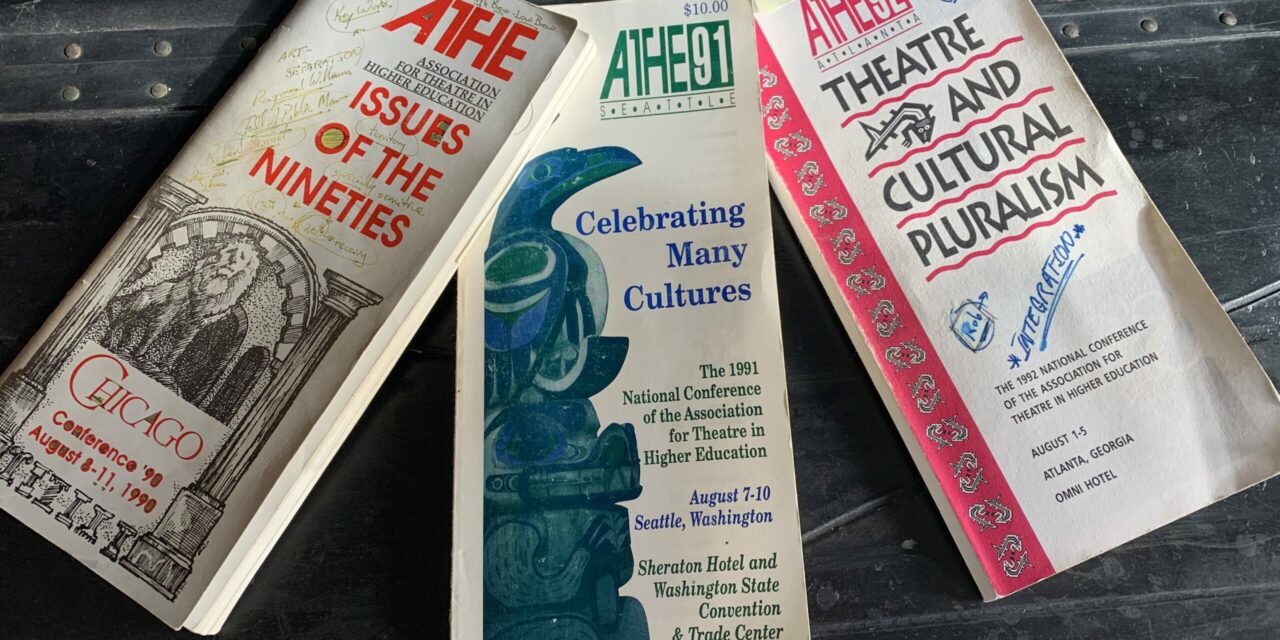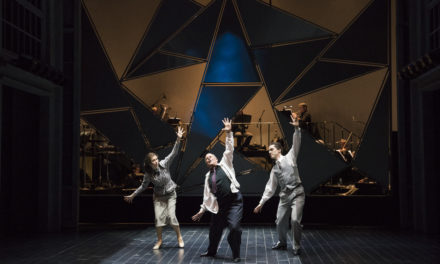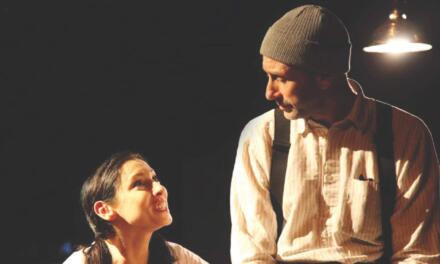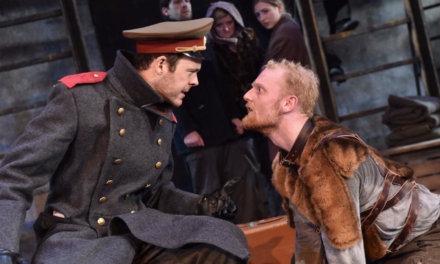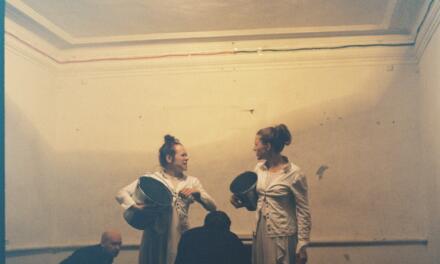Originally, this article was conceived as a section of an extended piece called, “Dramaturgs Reflect on the ATHE Dramaturgy Focus Group (DRFG),” with recollections about the DRFG from both founding members and current core members. The enthusiastic responses to my interview requests, however, made it necessary for the article to be divided into two parts, “Part I: The Foundation” and “Part II: The Present.”
The current article “Part I: The Foundation” contains interviews with members who were involved in the creation of the DRFG and the Dramaturgy Debut Panel. These practitioners have played an indispensable part in the continuing growth of not only the Focus Group but also dramaturgy in academia and the professional performing arts industry. This article also looks back at ATHE in the mid-1990s, when the DRFG first came into being, examining the issues explored back then as well as how the DRFG functioned in ATHE. Records of the ATHE programs from the 1990s, generously provided by Geoff Proehl, served as invaluable resources for this retrospective.
At the annual ATHE conference, which was founded in 1986, panels and workshops involving dramaturgs or dramaturgy had been offered since the early 1990s. While dramaturgy had been growing as a professional practice in the U.S. theatre scene since the 1970s and became solidified as an integral and practical profession in the theatre industry, it was still considered a relatively new discipline in academia. The early panels, organized by professors, therefore provided specialized presentations and discussions on the function of dramaturgy in relation to playwriting, directing, and other theatrical disciplines in an academic setting. These panels included “The Director/Dramaturg Relationship: The Academic Connection” (1991), “Writing About Performance,” (1992), and “Directors and Dramaturgs: Together Again for the First Time” (1992): to list a few. Some panels used the term dramaturgy broadly, to refer to a method of playwriting, such as “Playwriting Workshops in the New Dramaturgy: A Study in Len Jenkin’s Methodology” (1991) and “The New Soviet Dramaturgy: Glasnost and After” (1992). The function of the dramaturg in new play development was illuminated in “New Play Development Techniques: The Actors, Director, and Dramaturg” (1991) and “New Play Development Workshop” (1991, 1992). Yet some panels, such as “Considerations in Modernizing Period Plays” (1991), which from today’s perspective would call for a strong dramaturgical presence, did not include any dramaturg in the panel.
By 1992 and 1993, dramaturgs became the primary organizers of panels, which focused on the teaching and practice of dramaturgy. Highly esteemed practicing dramaturgs shared their personal practices, interpreted and presented contemporary dramaturgical practice done by others in the professional theatre, and acted as emissary representatives, working to educate their non-dramaturg theatre educator peers about trends, scholarship, and practice in the field, outside and inside the academy. Notable panels such as “Teaching Dramaturgy: A Discussion” (1992), “Dramaturgy/Pedagogy: Part I – Educating the Dramaturg,” and “Dramaturgy/Pedagogy: Part II – The Dramaturg and Education” (1993) were enriched by the participation of dramaturgs Victoria Abrash, Art Borreca, Anne Cattaneo, David Copelin, Heidi Gilpin, Susan Jonas, Michael Lupu, John Lutterbie, Richard Pettengill, Geoff Proehl, Elizabeth C. Ramirez, and Paul Walsh, as well as Oscar Brockett, who was a strong advocate for the role of the dramaturg in American theatre, university and professional. The “Special Interest Meeting: Literary Managers & Dramaturgs of the Americas Association” (1992), chaired by Elizabeth C. Ramirez, started a discussion between LMDA and ATHE. The collective effort of dramaturgs made dramaturgy an essential part of ATHE. In 1994, the Dramaturgy Focus Group was formed, then with the ATHE-identifying code “DR,” with founding members Susan Jonas, John Lutterbie, Geoff Proehl, and Elizabeth C. Ramirez. At the 1995 conference in San Francisco, a meeting between Geoff Proehl and Cynthia M. SoRelle would lead to the foundation of the Dramaturgy Debut Panel, which would launch in 1997 under the leadership of Cynthia M. SoRelle.
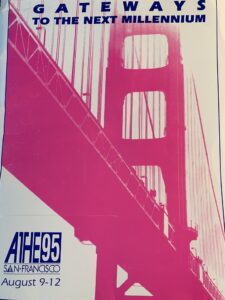
ATHE Program from 1995, Provided by Geoff Proehl. Photo: Walter Byongsok Chon
Putting 1995’s ATHE conference in context helps understand how fortuitous the foundation of the Dramaturgy Focus Group was. The 1995 San Francisco conference theme “Gateways to the Next Millennium” was inspired by the iconic Golden Gate Bridge and the upcoming Millennium. JoAnne Akalaitis delivered the Keynote address, “Living in Theatre.” Ellen Stewart and Marvin Carlson were honored with, respectively, the Career Achievement Award for Professional Theatre and the Career Achievement Award for Academic Theatre. The performance “WOWing the Millennium with Split Britches” featured an address by Sue-Ellen Case and performances by Deb Margolin and Split Britches’ Peggy Shaw and Lois Weaver. The conference introduced ATHEMOO, a “virtual space existing online for real-time discussion and interaction between participants,” accessible through two computers in the Exhibit Hall. The Dramaturgy Focus Group sponsored panels that continued to explore the practice of dramaturgy in an educational and academic setting, such as “Dramaturgy and Critical Discourse,” “Dramaturgy and Undergraduate Education,” “Dramaturgy; State of the Profession” and “Exploring the Relationship Between Dramaturgy and Directing,” while discussing the future of the group at the “Dramaturgy Forum Group Meeting”
The launching of the Dramaturgy Focus Group marks the rising recognition and need for dramaturgy in theatre practice and academia, as well as the group’s commitment to providing gateways for dramaturgy to spread across fields and generations. For the past twenty-five years, the Dramaturgy Focus Group has raised awareness of dramaturgy with scholars and practitioners of other disciplines and informed them of its significant function in practice, theory, development, production, criticism, education, and outreach. Specifically, the members have designed educational panels and lectures on how it enriches the process with the playwright and the director; how it can center a production in its historical, socio-political, and cultural context; how it contributes to the overall quality of the production as well as the experience of the production team, the creative team, and the audience; how it is embodied in translation and adaptation; and how it can be applied to and benefit disciplines and fields beyond the theatre.
The founding members Geoff Proehl, Susan Jonas, Elizabeth Ramirez, and John Lutterbie, and the founder of the Dramaturgy Debut Panel Cynthia SoRelle graciously provided their recollections. For the sake of this article’s length, some of their answers have been abridged.
Geoff Proehl
- Professor Emeritus, University of Puget Sound
- DRFG Member from inception to 2008, a regular participant in Focus Group, with exception of 1994, 2002, 2005, 2006
- Focus Group Rep (chair), Dramaturgy Focus Group of ATHE (Association for Theatre in Higher Education, 1998-2000
- Conference Planner, Dramaturgy Focus Group, ATHE, 1996-1998
Walter Chon (WC): How did you get involved in the Dramaturgy Focus Group?
To the best of my memory, John Lutterbie, Susan Jonas, and I met with Anne Cattaneo near Lincoln Center in 1991 or 1992. At the meeting, Susan took as her initiative a University Caucus Pre-Conference for LMDA (Literary Managers and Dramaturgs of the Americas, founded in 1985) and founded it; John took as his initiative establishing a Dramaturgy Focus Group for ATHE and founded it with Liz Ramirez, gathering signatures for a petition as I remember and campaigning for it; and I took as my initiative dramaturgy programming at the East Central Theatre Conference. John Lutterbie and Liz Ramirez were the starters/founders of the DRFG. I was a loyal foot soldier.
We supported one another in each of these initiatives. As we walked out the door after our meeting with Anne, Susan asked me if I wanted to work with her on a dramaturgy book. I said yes, and that was the genius of Dramaturgy in the American Theatre (Harcourt Brace College Publishers, 1997. Co-authored by Susan Jonas, Geoff Proehl, and the late Michael Lupu). We used ATHE panels over several years to support the development of the book.
I also, and this was even more important, used ATHE to develop the core of Towards a Dramaturgical Sensibility (Fairleigh Dickinson University Press, 2011) through a series of papers over several years. Cindy SoRelle has, of course, been central to the ongoing life of the group, its most constant factor, along with all of the great conference planners and focus group reps. Several focus group reps have also been president of LMDA, sometimes simultaneously: Shelley Orr, Martine Kai Greene, Bryan Moore (upcoming), and myself.
Fun fact, did you know that ATHE can ask to do a panel at LMDA and vice versa, and according to a coordination agreement, be granted one? At least that’s how it was.
WC: What do you consider as your biggest accomplishment?
Supporting those who were doing the actual work of starting the group and then supporting the life of the group by organizing and participating in panels for several years.]
WC: Could you share something about the Dramaturgy Debut Panel?
Cindy SoRelle’s work has been absolutely outstanding in this and so many ways. Her championing of our debut panelists has been ceaseless. I think the idea for the panel was hers, not mine. Cindy does what she says she will do, and that’s what happened.
Susan Jonas
Co-Founder & Curator at On Her Shoulders, Co-Founder & Curator at 50/50 in 2020
When I started with LMDA, its focus was professional dramaturgy. However, at least half of the members were academics. And most of the practicing dramaturgs were teaching to earn a living. The percentage of members who could support themselves on income from practical dramaturgy was laughable. Today it is far fewer and direr. I discussed with Geoff Proehl my frustration about the second-class status of the university members as well as the more profound issue that now that dramaturgy was in vogue, colleges and universities were recruiting teachers to teach the subject who had neither training nor experience. The quality, or lack thereof, of this education, threatened to diminish the value of the profession. Geoff encouraged me to speak with then-LMDA president Anne Cattaneo, and together we met with her in her office at Lincoln Center. We laid out our case for why we needed a university caucus, and her response was to go ahead and start one.
So for several years, I organized an LMDA pre-conference, which focused exclusively on teaching dramaturgy. The exchange in this pre-conference was both generous and profound. Both practical and academic dramaturgs, and predominantly hybrids, contributed pedagogical philosophy and methodology, as well as detailed lesson plans, bibliographies, articles, syllabi, and assignments. One outcome of this was the first LMDA University Caucus Resource, which collected and disseminated these materials to the membership at large and provided an incentive for teachers to join LMDA.
Another outcome was the development of the ATHE Dramaturgy Focus Group, headed by Goeff, John Lutterbie, and myself. This was a very significant event, as the ATHE’s national membership numbered in the thousands, and teachers across every discipline within theatre started seeing the words “dramaturg” and “dramaturgy,” and asking “What is that?” The struggle to define the slippery practice was exhaustive and exhausting, even controversial in some circles. Eventually, in an indirect way, this question and these gatherings led to a 600-page partial answer, Dramaturgy in the American Theatre. Our book represented the best minds and the best practices of the time, a spectrum of theories – often in conflict with each other – that celebrated the interconnection of things, curiosity, context, and collaboration, and the joys of curiosity and discovery. The contributions were largely commissioned and generated at the UCaucus and ATHE conferences. This book became an indispensable textbook for almost every undergraduate and graduate class.
I am intensely proud of the contribution Geoff and I made to expanding the reach, understanding, and constituency of dramaturgy through education, and the establishment and continued amelioration of standards of pedagogy in the field. This was achieved through the LMDA pre-conference, the ATHE Dramaturgy Focus Group, the LMDA UCaucus Sourcebook, and, above all, Dramaturgy in American Theatre. But what I treasure most about all these undertakings is the conversations. There were difficult, even painful conversations about representation and bias. A lot of arguing, swearing, and imbibing, but fundamentally bonhomie.
Elizabeth C. Ramírez
Founding Member, ATHE. Instructor, Our Lady of the Lake University. Dramaturg, The Classic Theatre of San Antonio. Professional Dramaturg.
I became a Founding Member of ATHE in 1986. I was elected to the Board of ATHE in 1988 as the Vice President for Administration. The Board of Governors members who approached me about vying for that position emphasized the need for diversity in the organization and suggested the position of Secretary, a position I was not willing to consider. However, when we discussed the opportunities that the position of VP might include, I emphasized my strong desire to bring Dramaturgy into the organization. I was in the midst of a Fellowship in Dramaturgy at the American Repertory Theatre Institute for Advanced Theatre Training, and my primary goal in the organization was to bring Dramaturgy, that area of applied theatre history and criticism, into ATHE. It was clear that VP of Administration would allow a voice about the structure and new directions, and although I had not realized that I had to be elected, I operated as though I was going to be the VP; fortunately, I won the election.
In 1988 I was in my second year of teaching at St. Mary’s University, San Antonio. I was fortunate to have a position in theatre after difficulty in finding a position at all in my field. However, that position was not allowing me to apply the kind of teaching, research and practice that I had been trained for at The University of Texas at Austin. Both of my mentors, Jack Brokaw and Oscar G. Brockett (Brock), warned me about the difficulties I would encounter in finding a position in higher education with my emphasis on Spanish-language performance in the United States and more so, as a woman. There were very few positions in the field, and in discussing the difficulty of finding a position teaching theatre history and criticism to undergraduates and graduates with Brock, it became clear that I had to have something distinct to offer. In finishing my dissertation, I was sitting in Brock’s Play Analysis classes, and I became absolutely intrigued with how the play could be informed by applying theatre history and criticism. In looking at all of the programs available, I quickly decided on American Rep where Robert Brustein was leading a program that included dramaturgy. I worked with Anne Bogart, Andre Serban, Alvin Epstein, Sobodan Unkovski, Liviu Ciulei, Arthur Holmberg, and many others while I was there.
I completed the Fellowship after a year and easily found numerous opportunities. I took a position at the University of Arizona, Tucson, where my expertise in multicultural theatre, Latina/Latino theatre, and dramaturgy were welcome additions to the Theatre Department. The next step was to bring that focus to ATHE, and as the VP of Administration, I was able to do so. The entire Board was receptive to this new focus group, and it was soon added to the long list of specialties in ATHE.
In order to garner interest and attention to dramaturgy, I became involved in LMDA and addressed the organization about the new focus group. With so many academic members and practicing dramaturgs, there was great interest, and the ATHE Dramaturgy Focus Group grew and grew. Geoff Proehl was perhaps the greatest advocate on the academic end. Mark Bly and Anne Cattaneo always made sure that I would get a platform to present my case, and the support that I needed because I was new and unknown to those already practicing professionally as dramaturgs and literary managers. John Lutterbie, Susan Jonas, and Cindy SoRelle took the entire group into new and important directions. All of these individuals not only spread the word, but they also gave their time and expertise. At the time, ATHE was driven by year-end conferences where the opportunities to present panel programs could garner the broadest interest, and these individuals were willing participants at these and other events in support of ATHE and the new focus group.
Unquestionably, the growth has been tremendous. But perhaps what stands out for me the most is Cindy taking the helm in terms of ushering in new members and young scholars and those hoping to enter the profession. My entry into ATHE was through opportunities to present my research on debut panels, programs on diversity, and discussion groups on the challenges of women in the field. It was the debut panels in ATHE and ASTR (American Society for Theatre Research) that were always the most coveted opportunities for new members trying to begin their academic careers. Cindy’s work has been outstanding in that regard. Cindy and I were both at UT, Austin, completing our doctorates, and in the occasional times we had to interact between our demanding work, I found Cindy to be always forward-looking and forward-thinking about those up-and-coming scholars, and her distinct attention to diversity has always stood out.
Perhaps my biggest accomplishment was to open a door for Dramaturgy in ATHE. But it has taken many voices and committed individuals with a passion for applying our in-depth study of theatre history and criticism into performance, to accomplish the success that we can see in this Focus Group. It was incredible to me that once I began working as a dramaturg in academic and professional setting, that the interest was widespread, from the director to the actors to the entire production team. I soon began to hear “how did I ever work without a dramaturg before?” I am very fortunate to be able to continue working in the field, and my specialty continues in diversity and Latina/Latino performance, with two books in the field, La Voz Latina: Contemporary Plays & Performance Works by Latinas on the American Stage Since the 1980s (University of Illinois Press, 2011), and Chicanas/Latinas in American Theatre: A History of Performance (Indiana University Press, 2000), and numerous articles and reviews.
John Lutterbie
- Professor, Chair of Theatre Arts Department, SUNY Stonybrook
- Co-founder of the ATHE DRFG, DRFG Chair, DRFG conference planner, LMDA Board of Directors, Founder of the Cognition, Theatre and Performance (think tank)
When I came to SUNY Stony Brook [in 1990] to head the MFA in Dramaturgy (now defunct), I knew little about the profession. Mark Bly, then at the Seattle Rep, was a great help in giving me a better idea of the field. At that time I was a regular at ATHE, doing more theory than dramaturgy, and a new member of LMDA.
There was, at that time, little or no communication between LMDA and ATHE. We felt that we needed to make a connection in order to better serve our students and other emerging dramaturgs. Geoff Proehl was involved in the discussions, as was Susan Jonas. We decided the means of introducing dramaturgy to ATHE was by doing a dramaturgy workshop in the early 1990s. Susan and I invited directors and designers as participants. They were put into small groups before the conference began. At the first meeting of the workshop, the play was discussed in general terms. They were then given a day or two to develop a production concept for a proposed performance. The second day of the workshop consisted of reports on how they would approach the play in production. It was sufficiently successful that the structure was repeated for at least one more, and perhaps two more years. Then the effort required to pull people together became too much and the practice was abandoned.
By that time, we had created energy [in our ATHE colleagues for learning more about the history and practice] of Dramaturgy, and the next step was to propose the creation of a Dramaturgy working group. We went through the process of creating by-laws, electing officers and all else that goes into organizing a working group. The proposal was accepted and, as they say, the rest is history. The most onerous job, as always, was the person in charge of conference planning.
I suspect my biggest accomplishment was helping to bring LMDA and ATHE together through the DRFG, and helping to define the various roles and the value of the dramaturg to a population that knew less than I did about dramaturgy. Other than that, enjoying a collegial relationship with the people I met through LMDA and its wonderful conferences that I attended – Susan Jonas, Geoff Proehl, D. D. Kugler, Mark Lord, and Tori-Haring Smith in particular, but many others as well. They have enriched my thinking immeasurably.
Cynthia M. (Cindy) SoRelle
- Professor, McLennan Community College
- Founder of ATHE Dramaturgy Focus Group
It has been my pleasure to serve as Dramaturgy Focus Group Conference Planner (1998-2000), FG Representative (2000-02), and Nominations Chair (2002-05) as well as ATHE new play development dramaturg for three conferences. My first involvement in the Dramaturgy Focus Group occurred at the 1995 San Francisco conference when Elizabeth C. Ramirez (University of Oregon) introduced me to Geoff Proehl (University of Puget Sound) and invited me to participate with them in the new Dramaturgy Focus Group as a Committee member. Elizabeth and I had met at the University of Texas at Austin in the Ph.D. program, where we had the privilege of studying with our mentor, Distinguished Professor Oscar G. Brockett. Meeting Geoff Proehl at ATHE San Francisco would have a profound impact on me, and to this day I consider him my other most valued mentor, both through ATHE and LMDA, our affiliated organization, where I later had the opportunity to serve both as Board member and LMDA Board Chair.
It was Geoff who suggested to the group that we institute a Dramaturgy Debut competitive panel, and he asked me if I would take on the task. Our first panel was held in Chicago at the 1997 conference, and we have demonstrated our commitment to emerging dramaturgs by hosting the panel at every conference since—and by inviting dozens of professional dramaturgs, through our relationship with LMDA, to adjudicate. In 1999 and 2001, professional adjudicators Lynn Thomson and D. D. Kugler guest chaired while I was teaching overseas; I had the great privilege of chairing all others until 2016—again in Chicago—when I served as Co-Chair with Shelley Orr (San Diego State University), who currently chairs the debut competitions. For the Dramaturgy Focus Group, Shelley’s mentorship of our emerging dramaturgs today brings us full circle; she was selected for the 1997 founding panel for her work on UC San Diego’s American premiere of Marguerite Duras’ India Song. Like Shelley, our emerging dramaturgs have a remarkable record of ATHE participation and leadership for more than two decades, including both Dramaturgy and Theatre History Focus Groups as well as ATHE elected leader positions. I’m so gratified to have participated in this continuity.
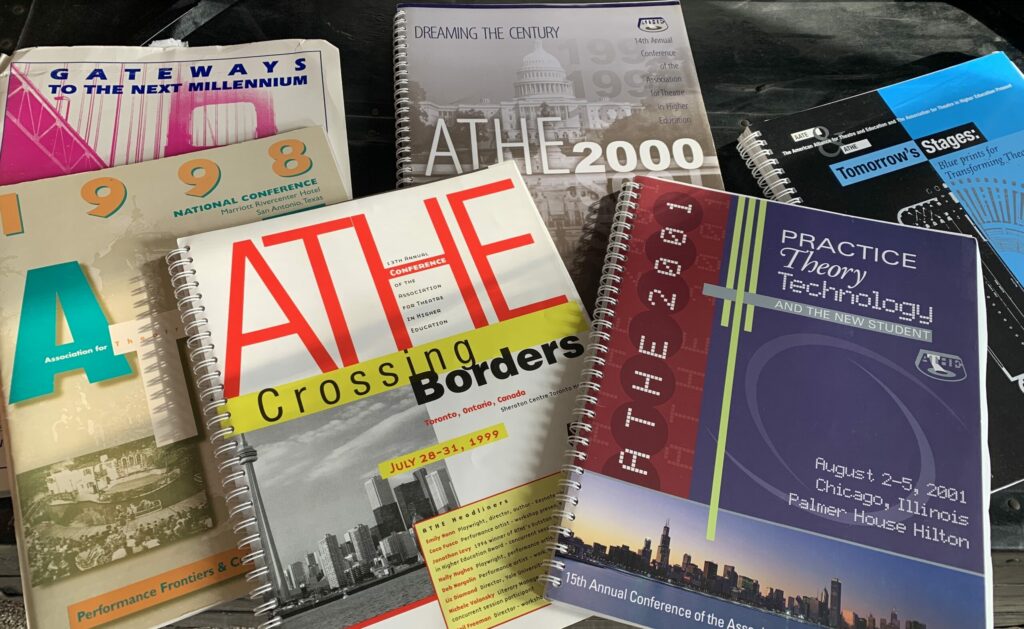
ATHE Programs from Around the Millennium, Provided by Geoff Proehl. Photo: Walter Byongsok Chon
To be continued in “Dramaturgs Reflect on the ATHE Dramaturgy Focus Group (DRFG) Part II: The Present.”
This post was written by the author in their personal capacity.The opinions expressed in this article are the author’s own and do not reflect the view of The Theatre Times, their staff or collaborators.
This post was written by Walter Byongsok Chon.
The views expressed here belong to the author and do not necessarily reflect our views and opinions.

